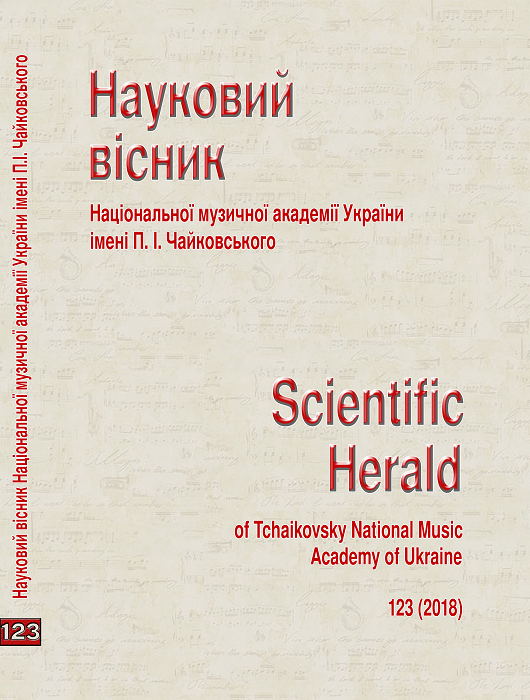Peculiarities of the authorship manifestation in the world music
DOI:
https://doi.org/10.31318/2522-4190.2018.123.152509Keywords:
Deep Forest creativity, “Eve” album by Angélique Kidjo, DakhaBrakha creativity, field recording, quotation principleAbstract
Relevance of the study. The study of the world music is associated with many methodological problems, since the musicological toolkit to analyze this music has not yet been developed in Ukraine. The need for its development represents the relevance of this study.
The main objective of the study is to consider the peculiarities of authorship in the world music.
Methodology of the study. To reveal these peculiarities, the study material containing the compositions of the world’s most popular musicians of world music, namely the French band “Deep Forest”, the Benin singer Angélique Kidjo, and the Ukrainian band “DakhaBrakha”, was selected. In all three examples, the facts of borrowing “someone else’s” musical text were discovered. The use of “someone else’s” text in the analyzed compositions appeals to the issues of quotation in music, which were considered in detail in musicology literature by many researchers. It should be noted that the use of the quotation theory in relation to the world music is a process of adaptation of the musicological toolkit, which has developed in the music of academic tradition. However, this process is due to the lack of the required musicological toolkit for world music, which demonstrates the methodological problem of researching this kind of music.
Results and conclusions. The use of «someone else’s» musical text in the works of the world music musicians allows us to admit the idea that we face the fact of “double authorship”. But the authorship of «someone else’s» text is actually misappropriated by the musicians of the world music. However, the functioning of “someone else’s text” in the considered examples as a quote in relation to the author’s part of the compositions can explain the fact of misappropriation of someone else’s material, since the use of the quotation does not require “double authorship”. The use of the quotation theory for the analysis of world music explains the significance of the study findings.
References
Aranovskiy, M. (1977), Pyatnadtsataya simfoniya D. Shostakovicha i nekotoryie voprosyi muzyikalnoy semantiki. Voprosyi teorii i estetiki muzyiki, 15, pp. 55–94.
Boiko, O. (2009), World music: ekonomichni, politychni ta sotsiokulturni peredumovy rozvytku etnichnykh tendentsii u suchasnii populiarnii muzytsi. Studii mystetstvoznavchi, 4(28), pp. 106–111.
kanal (2016), DakhaBrakha: «Chas. Online» na 5.ua // 15.11.2016. [video]. Available at: https://www.youtube.com/watch?v=4V5CC0Yh-Vc [Accessed 14 Jun. 2018].
Lytovka, Ya. (2013), «World-music» yak zasib natsionalnoi identyfikatsii v umovakh hlobalizatsii. Visnyk Kyivskoho natsionalnoho universytetu kultury i mystetstv, 28, pp. 101–107.
Lytovka, Ya. (2013), «World-music» yak yavysche, porodzhene protsesamy hlobalizatsii. Visnyk Kyivskoho natsionalnoho universytetu kultury i mystetstv, 29, pp. 91–100.
Chekan, Yu. (2009), Intonatsiinyi obraz svitu. Kyiv: Logos.
Angélique Kidjo «Fifa» (1996), [Booklet] Mango, Island Records.
Angelique Kidjo returns with new album «EVE» on 429 Records, (2012). Angelique Kidjo Official Website. [online] Available at: URL: http://www.kidjo.com/news-list/2018/1/30/angelique-kidjo-returns-with-new-albumeve-on-429-records [Accessed 14 Jun. 2018].
Feld, S. (2000), A Sweet Lullaby for World Music. Public Culture, [online] Volume 12(1). pp. 145–171. Available at: https://read.dukeupress.edu/public-culture/article-abstract/12/1/145/31579/A-Sweet-Lullaby-forWorld-Music?redirectedFrom=fulltext [Accessed 14 Jun. 2018].
Feld, S. (2000), The Poetics and Politics of Pygmy Pop. In: G. Born and D. Hesmondhalgh, ed., Western Music and Its Others. Difference, Representation, and Appropriation in Music, 1st ed. Los Angeles, London: University of California Press, pp. 254–279.
Laade, W. (1974), Musique de Guadalcanal, Salomon Islands, recorded by Hugo Zemp & Fataleka and Baegu Music, Malaita, Solomon Islands, recorded by Hugo Zemp [compte-rendu]. Journal de la Société des Océanistes, [online] Volume 45, Tome 30. pp. 314–315. Available at: http://www.persee.fr/doc/jso_0300- 953x_1974_num_30_45_2674_t1_0314_0000_2 [Accessed 14 Jun. 2018].
Lange, B. (2015), Folk Music and Commercialization in Danubian Trances and Boheme. Dancecult: Journal of Electronic Dance Music Culture, [online] Vol. 7(1). pp. 97–115. Available at: https://dj.dancecult.net/index.php/dancecult/article/view/509/610
Recording Academy Grammy Awards, (2018), Recording Academy Grammy Awards Official Website. [online] Available at: https://www.grammy.com/ [Accessed 14 Jun. 2018].
Sweeney, P. (1992), The Virgin Directory of World Music. New York: An Owl Book, Henry Holt and Company.
Taylor, T. (1997), Global Pop: World Music, World Markets. New York and London: Routledge.
Frith, S. (Ed.) (1989), World music. Politics and Social Change. Papers from the International Association for the Study of Popular Music. Manchester: Manchester University Press.


